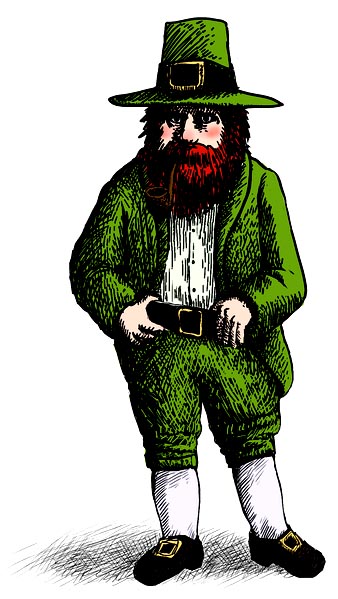 |
| A Leprechaun (Wikipedia) |
Note: The Irish have contributed hugely to world culture, including some English words you know--and didn't know were Irish!
Get Ready: Do you know any Irish words?
Happy Saint Patrick's Day! In honor of the holiday, let's look at some fairly common English words derived from Irish usage.
Read this conversation, filled with Irish words. Do the Practice, check your answers in the first comment below, then read the Paraphrase and the Explanation.
A lad and a colleen were arguing over who had found the prettiest shamrock by the nearby bog.
--------"'Tis I who found it!" he shouts.
"'Tis not!" says she.
In steps their father: "Stop keenin' like banshees, the both of ya, or I'll whack ye with me shillelagh."
"Oh, some bard ye are," says the lad.
"Enough of yer blarney," replies the dad, "or I'll call the paddy wagon on ye."
"Oh, yeah?" says the colleen. "How about I smash yer whiskey bottle to smithereens?"
"Get, pooka!" says the dad to the colleen. And to the lad, "You too, ya little leprechaun, ya!"
And there were laughs galore.
Read more: https://en.wikipedia.org/wiki/List_of_Irish_words_used_in_the_English_language
Practice: Match the term to its definition below:
- banshee
- bard
- blarney
- bog
- colleen
- galore
- keen
- leprechaun
- paddy wagon
- pook (or pooka)
- shamrock
- shillelagh
- smithereens
- whiskey
- a three-leaf clover
- a girl
- an Irish elf
- an alcoholic drink, the "water of life"
- smooth talk
- police vehicle for transporting prisoners
- a kind of demon
- wet, spongy ground
- very small pieces
- to wail; to lament
- a poet
- a mischievous spirit
- lots of
- a wooden club
Answers are in the first comment below.
Here's the conversation again, with the English meanings substituted for the Irish words.
A boy and girl were arguing over who had found the prettiest three-leafed clover by the wet, swampy area nearby.
"I found it!" he shouts.
"No you didn't!" says she.
Their father steps in and says: "Stop wailing like demons, both of you, or I'll hit you with my club. "
"Oh, some poet you are," said the boy. [meaning his words were not beautiful]
"Enough of your nonsense," replies the dad. "I'll call the police to take you away."
"Oh, yeah?" says the girl. "How about I smash your bottle of alcohol into tiny pieces?"
"Go away, you imp!" says the dad to the girl. And to the lad, "You too, you little elf!"
And there was lots of laughter.
Explanation of the Answers: After you check your answers in the first comment below, read on for more information on the Irish words.
- banshee: originally a woman of the fairies, this is commonly used to mean a demonic presence or a harpy. When I was a child people often referred to someone as "screaming like a banshee."
- bard: a poet. This word shares its Old Celtic roots with words in Scottish Gaelic and Welsh.
- blarney: smooth talk, or even nonsense. A tradition says that if you kiss "The Blarney Stone" in Castle Blarney, you'll receive "the gift of gab"--the ability to persuade people easily.
- bog: from a word meaning soft, this is an area of wet, spongy ground.
- colleen: it simply means a girl. It's now often used as a girl's name.
- galore: lots of. From the Irish words go leor, meaning enough or to sufficiency. We place it after a noun, and use it in expressions like, "I had fun galore" or "My office has work galore this week."
- keen: not the adjective, but a verb meaning to wail or to lament. "The women were keening at the funeral."
- leprechaun: this is an Irish elf, the little men in green who hide a pot of gold at the end of the rainbow. They can also be quite mischievous; see pook below.
- paddy wagon: police vehicle for transporting prisoners. Early Irish immigrants to America were rudely called paddys (because of the influence of St. Patrick on Ireland's history, Patrick was and is a popular name for Irish men). As many Irishmen became policemen in New York, the vehicle they used was called a paddy wagon.
- pook (or pooka): a hobgoblin, demon, or mischievous spirit. Shakespeare used the form Puck to name the troublemaker in his play, A Midsummer Night's Dream.
- shamrock: a piece of clover with three leaves, used as a symbol for Ireland.
- shillelagh: a wooden club. Commonly pronounced shi-LAY-lee in American English.
- smithereens: no one is sure what smithers means, but -eens is an Irish diminutive ending (like -ette on cigarette, or -y/-ie on the end of name, making Tom into Tommy or Debra into Debbie.) So smithereens means very small pieces: "I dropped the vase, and it was smashed to smithereens."
- whiskey: the Irish claim the honor of naming this drink, from the words uisce beatha meaning "water of life." (Some believe the word came from other sources.)
Submitted to the Shenzhen Daily for March 17, 2008 (St. Patrick's Day)


Answers to the Practice: 1. g; 2. k; 3. e; 4. h; 5. b; 6. m; 7. j; 8. c; 9. f; 10. l; 11. a; 12. n; 13. i; 14. d
ReplyDelete